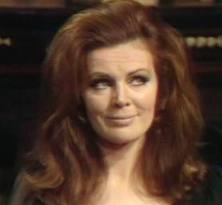 |
| Miss Baltimore Crabs helped Hairspray win big at the Hayzies. |
I had to excuse myself from many of my judging responsibilities in 2011, due to scheduling conflicts, so the winners announced last night at the Warner Theatre were mostly for shows I had not seen. A few thoughts on the awards ceremony itself:
 |
| Twyford and Curry sparkled. |
I'll say upfront that the co-hosts Felicia Curry and Holly Twyford were absolutely terrific. I usually hate the stage banter which award shows insist upon including, but the dialogue between our two hosts, written by Renee Calarco, was refreshingly bright and intelligent.
The concept of mixing theatrical talent with DC politicos and media personalities as presenters was not a success. The civilians involved seemed to be trying to pass themselves off as great supporters of DC theatre. But none of these so-called arts supporters gave any indication that they ever actually attend live theatre.
 |
| Holmes-Norton shmoozed Kevin Spacey. She should have read about DC theatre instead. |
The most egregious example was that of DC Rep. Eleanor Holmes-Norton. She presented several awards for which Synetic Theatre was nominated. Each and every time she announced their name, she called them "Synthetic Theatre." This is a company which, arguably, has gained the most notable national reputation of any homegrown theatre in the past 10 years. And Holmes-Norton clearly had never heard of them.
 |
| Kevin Spacey was hilarious and sincere. |
The show itself was very entertaining, and seemed to move along pretty well, particularly in the hands of Felicia, Holly, and guest honoree Kevin Spacey. There is a shaky video of Spacey's acceptance speech here, it's worth a look, especially for his final advice. I've got some advice, too, what are the odds?
A few days ago, critic Nelson Pressley wrote this well-considered article regarding ways to make the awards more representative of the full spectrum of DC theatre. I agree with him on all points. In a nutshell, he suggests splitting the awards into two realms, separating the Big Boys with the Big Budgets from the smaller kids with the smaller budgets. How to make room for a doubling of the awards given? I have a suggestion I have heard from no one else: it's time to retire the awards given to "Non-Resident Productions."
I understand the reasoning behind these award categories being created in the first place. According to the TheatreWashington's website, there were fewer than 10 producing theaters in the DC area 28 years ago, when the Hayzies were created.
 |
| I saw Derek Jacobi's Cyrano in L.A. A year later, he won the first Hayes award for Lead Actor in a Touring Production. |
Including "touring productions," as they were called back then, was a smart move. These touring productions which swept through the area via the Kennedy Center, or the National or Warner Theaters, or occasionally Fords, often had stars with name recognition; awarding these performers probably garnered attention in the national trade publications which the fledgling Helen Hayes Awards would have been hard pressed to grab on their own.
 |
| Estelle Getty won a Touring Hayzie for Torch Song Trilogy |
A glance at the first awards given in 1985 backs up that suspicion: the "touring production" awards that first year went to Derek Jacobi in Cyrano de Bergerac, Estelle Getty in Torch Song Trilogy, and the gal who sang "Memory" in Cats. The Outstanding Touring Production that year was the aforementioned Cyrano, presented by the Kennedy Center but produced by the Royal Shakespeare Company.
And that's my point. These non-resident productions are not cast nor directed nor rehearsed nor produced locally, they are merely presented here. I'm sure we're glad to have them, but do we need to consider these productions for awards which were created to celebrate our local theatre artists?
In the early Hayzie days, non-DC productions were all touring shows, and nowadays, that's not always true. Arena, Studio, The Shakes, and Woolly Mammoth are likely to import outside productions to fill out their seasons, and there is nothing wrong with that. But these productions are presented in our area, rather than produced here, and such shows are no longer vital to the national profile of our region.
 |
| Mike Daisy was up for an award for his Steve Jobs monologue. |
We are only talking about four awards here, but in my opinion, they are no longer pertinent. None of the three performers who won in the non-resident categories last night were in attendance to claim their awards, and why should we expect them to be? There may be a bit of starry excitement when Cate Blanchett wins one of our awards, but that flame flares out almost immediately when she, predictably, doesn't show up.
 |
| Cate Blanchett was not expected to travel halfway around the planet to pick up her Helen Hayes Award for Uncle Vanya. |
But why are we honoring out-of-town actors anyway? Why are we awarding productions which were grown elsewhere, just because they occupy one of our theaters for a month or two? We certainly don't need the promotional publicity, as our nominees and winners are now routinely published in all the national trades and in the New York Times, too. Let's retire the four non-resident Helen Hayes Awards, and fully celebrate our local theatrical artistry. And get to the after-party quicker!






















































































,+Olney+Theatre+Center,+2004.jpg)



,+Shakespeare+Theatre+Company,.jpg)


,+Warehouse+Theatre,+1999.jpg)
,+Are.jpg)
,+Everyman+Theatre,2002.jpg)
,+First+Nationa.jpg)
,+Shakespeare+Theatre+Company,.jpg)






,+Granada+Th.jpg)
,+Globe+Playhouse,.jpg)
,+CSUN,+1976.jpg)


